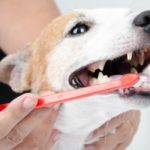Table of Contents
Written By Ashley Tonkens Animal Wellness Magazine
These handy summer pet safety tips will keep your four-legged friends happy and healthy when you’re having fun in the sun, going for a dip, and during all your summer excursions.
There’s nothing like a summer adventure with your four-legged bestie! But summer also brings some hazards for your furry pal. Veterinarians Don LeHoullier, owner of Countryside Veterinary Clinic, and Dr. Louis DelGiudice, National Emergency Specialty Director with AmeriVet Veterinary Partners, understand summer risks. They’ve offered some great summer pet safety tips that will keep your furry friend happy and healthy all summer!
Avoid Mid-Day Walks
The coolest part of the day is in the morning or evening. This is the best time to exercise or go for a walk. The hottest part of the day is between 3:00 and 4:30 p.m. Avoid strenuous activity with your furry buddy around this time because they can overheat. If you have to go for a walk around this time, be mindful of how hot the pavement is. Walk on cooler surfaces like grass instead or use boots or balms to protect sensitive paws.
Always Have Water Available
No matter what you’re doing or where you go, always take water and a bowl for your dog or cat. Offer water regularly to prevent dehydration. This is even true if you’re at the beach or swimming! Natural bodies of water can contain bacteria, and dogs shouldn’t drink salt water.
Make Time for Breaks
When you’re out walking, hiking, or doing something active, stop frequently to give your animal a rest. Signs your dog needs a break? Loud panting or the tongue hanging out the side of their mouth.
Use Sun Protection
Animals can get sunburns, especially ones with light coats, short fur, or alopecia. A lightweight jacket can help protect them from the sun, or you can use sunscreen. Don’t forget to apply sunscreen on their ears and nose as well!
Practice Good Water Safety
Even if your dog knows how to swim, you should never leave them unsupervised around water. Lots of dogs are natural swimmers, but others may need swimming lessons. There are doggy lifejackets for pups that aren’t strong swimmers, and lifejackets are always a good idea if you’re on a boat. Rinse your dog after swimming to remove chlorine or salt from their fur. Don’t let them drink pool water (chlorine) or salt water.
Don’t Leave Animals in the Car
It can take only minutes for a pet to develop heat stroke and suffocate in a car. A car can reach upwards of 90 F in the shade and up to 160 F in the sun, so never leave a dog or cat alone in a hot car.





